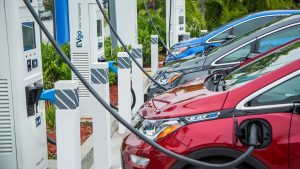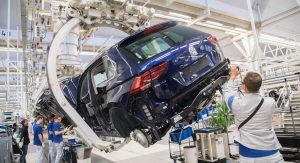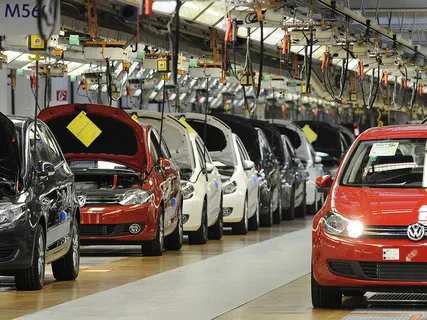Germany’s auto industry has long been a global leader in automotive innovation and manufacturing. However, the recent introduction of stricter emission standards has presented both challenges and opportunities for the industry. In response to these new regulations, the German auto industry has been innovating at an unprecedented pace to meet the stringent emission standards. These standards are not just minor adjustments but significant overhauls in how vehicles are designed, manufactured, and operated. The drive towards lower emissions has pushed the industry to explore new technologies and materials that can reduce the environmental impact of their vehicles. As a result, the German auto industry is moving towards sustainability, ensuring that their vehicles are not only high-performing but also environmentally friendly. This shift is evident in the increasing number of hybrid and electric vehicles being developed and the adoption of cleaner manufacturing processes.
Germany’s Push for Electric Vehicles

One of the most significant changes driven by environmental regulations is the push towards electric vehicles (EVs). The German auto industry has been making a substantial shift towards electric vehicles to ensure compliance with the new environmental standards. This shift is not just a trend but a necessary transformation to meet the emissions targets set by the government. Electric vehicles offer a viable solution to reduce greenhouse gas emissions and dependence on fossil fuels. The push for EVs has led to significant investments in research and development, resulting in innovative electric vehicle technologies that are both efficient and affordable. The environmental rules have been a driving force behind this innovation, encouraging manufacturers to develop vehicles that meet the high standards of performance and sustainability that consumers and regulators demand.
Impact of Environmental Regulations on German Auto Manufacturers
The impact of environmental regulations on German auto manufacturers has been profound. The industry has been compelled to shift towards electric vehicle production to meet the stringent emission standards. This shift is not merely about changing the type of vehicles produced but also involves rethinking the entire manufacturing process. Traditional internal combustion engines are being replaced with electric motors, and the infrastructure required to support electric vehicles, such as charging stations, is being rapidly developed. The environmental rules have driven innovation within the industry, pushing manufacturers to explore new technologies and materials that can help reduce the carbon footprint of their vehicles. This has led to advancements in battery technology, lightweight materials, and more efficient manufacturing processes, ensuring that the German auto industry remains at the forefront of automotive innovation.
Government Incentives for Green Technology
The German government has played a crucial role in supporting the auto industry’s transition to greener technologies. Government incentives have been instrumental in boosting the adoption of green technology within the German auto industry. These incentives include subsidies for electric vehicle purchases, tax breaks for manufacturers investing in sustainable technologies, and funding for research and development projects focused on reducing emissions. These measures have provided the financial support needed for the industry to invest in eco-friendly innovations. The environmental rules have driven the auto industry to adopt these technologies, ensuring that Germany remains a leader in automotive innovation while also meeting its environmental goals. The government’s commitment to sustainability has created a favorable environment for the development and adoption of green technologies, benefiting both the industry and the environment.
Challenges Faced by Traditional Car Makers
Despite the progress made, traditional car makers in Germany face significant challenges in adapting to the new environmental regulations. The stringent environmental regulations have put immense pressure on the industry to reduce emissions and adopt cleaner technologies. Traditional car makers, which have long relied on internal combustion engines, are struggling with the high costs associated with electric vehicle production. The transition to electric vehicles requires substantial investments in new manufacturing processes, technology, and infrastructure. Additionally, the development of electric vehicles involves overcoming technical challenges related to battery efficiency, range, and charging times. These challenges have made it difficult for traditional car makers to compete with newer companies that are solely focused on electric vehicles. However, the industry is resilient and is continuously working to overcome these obstacles through innovation and collaboration.
Technological Innovations in Response to Environmental Rules
In response to the stringent environmental rules, the German auto industry has been at the forefront of technological innovation. The industry has been investing heavily in the development of electric vehicle technologies, resulting in significant advancements in battery technology, charging infrastructure, and vehicle efficiency. These innovations are not only helping manufacturers meet emission standards but also providing consumers with more reliable and efficient electric vehicles. Additionally, the industry is investing in sustainable manufacturing processes to reduce the environmental impact of vehicle production. This includes the use of recycled materials, energy-efficient manufacturing techniques, and the reduction of waste and emissions during the production process. These technological innovations are ensuring that the German auto industry remains competitive while also contributing to global efforts to combat climate change.
Future Prospects for the German Auto Industry

Looking ahead, the future prospects for the German auto industry appear promising. The industry is making significant investments in electric vehicle technology, ensuring that it remains at the cutting edge of automotive innovation. These investments are not only helping manufacturers meet current emission standards but also preparing them for even stricter regulations in the future. The adoption of stricter emissions standards is driving the industry towards sustainability, ensuring that Germany continues to lead the way in producing environmentally friendly vehicles. The commitment to innovation and sustainability is positioning the German auto industry for long-term success, ensuring that it can meet the demands of consumers and regulators while also contributing to global efforts to reduce greenhouse gas emissions. The future of the German auto industry is one of continued innovation, sustainability, and leadership in the global automotive market.




